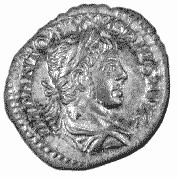Excerpts From the Salic Laws of the Franks
Return to the Roleplaying Page
The excerpts which follow come from the first attempts by the Frankish kings to put an end to the cycle of vendetta which were decimating Frankish families, and to formalize and standardize the penalties for crimes. These "Real World" examples can be used as a guide to penalties imposed in a fantasy milieu similar to that of the early Franks. Note that imprisonment was not intended as a form of punishment, but merely to restrain the culprit from flight both before the trial, and afterwards until the fine had been paid.
 The penalties are given in denarii (singular: denarius), a silver Roman coin which was of variable value. (The coin shown to the right is a denarius of Elagabalus, c. 220 AD). In theory, the weight of 40 silver denarii should be equivalent in value to the weight of one gold solidus, but in practise this was not always the case. In times of inflation, the denarius could even be minted of base metals like copper, and it was the copper denarius which led to the English abbreviation "d" for pennies.
The penalties are given in denarii (singular: denarius), a silver Roman coin which was of variable value. (The coin shown to the right is a denarius of Elagabalus, c. 220 AD). In theory, the weight of 40 silver denarii should be equivalent in value to the weight of one gold solidus, but in practise this was not always the case. In times of inflation, the denarius could even be minted of base metals like copper, and it was the copper denarius which led to the English abbreviation "d" for pennies.
Manslaughter
- If anyone is convicted of killing a free Frank, or a barbarian living under the Salic Law, he shall pay 8,000 denarii
- If he has put the body in a well, or under water, or has covered it with branches or other things for the purpose of hiding it he shall pay 24,000 denarii
- If anyone kills a man in the King's trust, or a free woman, he shall pay 24,000 denarii
- If he kills a Roman who was the table-companion of the King, he shall pay 12,000 denarii
- If the slain man was a Roman landowner, and not a table-companion of the King, he who slew him shall pay 4,000 denarii
- If anyone kills a Roman tributarius [one subject to tribute; i.e. a Roman subject], he shall pay 2,400 denarii
Injuries
- If anyone destroys the hand or the foot of another, or cuts out his eye or cuts off his nose, he shall pay 4,000 denarii
- If the injured hand hangs loose and useless, he shall pay 2,500 denarii
- If anyone cuts off the thumb or great toe of another, he shall pay 2,000 denarii
- If the thumb or the toe hangs useless he shall pay 1,200 denarii
- If he cuts off the second finger, by which the bowstring is drawn, he shall pay 1,400 denarii
- If he cuts off the rest of the fingers (that is, the other three) at one blow he shall pay 2,000 denarii
- If he cuts off two of them he shall pay 1,400 denarii
- If he cuts off one of them he shall pay 1,200 denarii
Wounds
- If anyone is convicted of trying to kill another, even though he fails he shall pay 2,500 denarii
- If anyone is convicted of shooting a poisoned arrow at another, even though he misses him, he shall pay 2,500 denarii
- If anyone wounds another in the head, so that the brain appears and the three bones which lie above the brion are uncovered, he shall pay 1,200 denarii
- If anyone wounds another between the ribs or in the abdomen so that the wound can be seen and extends to the vitals, he shall pay 1,200 denarii besides 200 denarii for the healing
- If anyone wounds another so that the blood falls to the ground, he shall pay 600 denarii
- If a freeman strikes another freeman with a club so that the blood does not flow, he shall pay 120 denarii for each blow, up to three
- If the blood does flow, he shall pay as much for each blow as if he had wounded him with a sword
- If anyone strikes another with the closed fist, he shall pay 120 denarii for each blow, up to three
- If anyone is convicted of trying to rob another on the high road, even though he fails, he shall pay 2,500 denarii
Return to the Front Page
 The penalties are given in denarii (singular: denarius), a silver Roman coin which was of variable value. (The coin shown to the right is a denarius of Elagabalus, c. 220 AD). In theory, the weight of 40 silver denarii should be equivalent in value to the weight of one gold solidus, but in practise this was not always the case. In times of inflation, the denarius could even be minted of base metals like copper, and it was the copper denarius which led to the English abbreviation "d" for pennies.
The penalties are given in denarii (singular: denarius), a silver Roman coin which was of variable value. (The coin shown to the right is a denarius of Elagabalus, c. 220 AD). In theory, the weight of 40 silver denarii should be equivalent in value to the weight of one gold solidus, but in practise this was not always the case. In times of inflation, the denarius could even be minted of base metals like copper, and it was the copper denarius which led to the English abbreviation "d" for pennies.